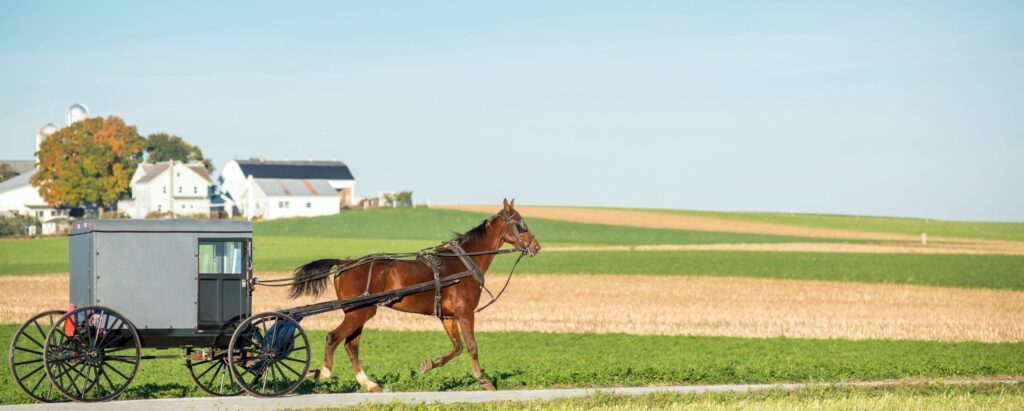Disclosure: This post may contain affiliate links. If you click on a link I may make a small commission at no extra cost to you. You can read the full disclosure here.
Last Updated on November 8, 2023 by Alex
In the quiet landscapes of rural North America, the Amish community thrives, embracing a way of life steeped in tradition, simplicity, and a profound commitment to self-sufficiency.
However, many people ask one big question about Amish culture: Do the Amish pay taxes?
In this post, you’ll learn about the unique relationship between the Amish and the U.S. tax system. While their horse-drawn Amish buggy and communal living may set them apart, the Amish are not exempt from the financial obligations that shape the broader American society.
Who Are The Amish

The Amish church is a group of traditionalist Christian church fellowships with Swiss Anabaptist origins. They are closely related to, but distinct from, Mennonite churches. The Amish are known for simple living, plain dress, reluctance to adopt many conveniences of modern technology and a strong commitment to community and family.
Here are some key aspects of the Amish way of life.
Religious Belief
The Amish are Anabaptists, meaning they trace their religious heritage to the Radical Reformation of the 16th century. They emphasize adult baptism, pacifism, Amish marriages, and the separation of church and state. Faith is central to Amish belief, influencing everything from dress to work habits.
Simple Living
Amish life is one of simplicity and humility. They avoid ostentatious displays of wealth and typically live in rural areas, engaging in agriculture and other trades. If you want to have a similar lifestyle learn some frugal living tips here.
Plain Dress
Amish clothing is distinctive and reflects their commitment to modesty and humility. Men often wear plain suits and hats, while women wear modest dresses and bonnets. Clothing styles can vary among different Amish affiliations.
Limited Use Of Technology
The Amish population is known for their limited use of modern technology. While practices can vary among different communities, many avoid electricity, televisions, computers, and cars. They emphasize manual labor and traditional craftsmanship. Whether is possible to live without the internet in the modern world, check here.
Community And Family Focus
Amish communities place a strong emphasis on close-knit relationships within the community and family. Social structures are designed to support one another, and decisions are often made collectively.
Education
The Amish typically educate their Amish children within their own communities. Formal education for the Amish youth often extends only through the eighth grade, emphasizing practical skills and vocational training.
Limited Interaction With The Outside World
While an Amish man or Amish woman may engage with non-Amish workers for economic purposes, they often limit interactions that might compromise their values. They are cautious about adopting external influences that could erode their distinct way of life.
Do The Amish Pay Taxes

Yes, Amish people pay taxes in the United States. While the Amish community often leads a simple and traditional lifestyle that includes practices such as farming without modern machinery and avoiding certain technologies, they are still subject to the same tax laws as other citizens.
Amish individuals and businesses are required to pay income taxes, property taxes, and other applicable taxes. However, there are some exemptions and special considerations that apply to the Amish in certain situations. For example, some Amish communities may be exempt from Social Security taxes based on religious beliefs. These exemptions are usually handled on a case-by-case basis.
Tax laws can be complex, and individuals or communities may seek advice from tax professionals who understand the specific circumstances of the Amish way of life. Overall, though, the Amish are generally subject to the same tax obligations as any other individuals or businesses in the United States.
Are The Amish Exempt From Social Security

Yes, many Amish individuals are exempt from paying Social Security taxes. The exemption is based on their religious beliefs and the tenet of self-sufficiency within their communities. The Amish faith believes in providing for their elderly and infirm through their own community support systems rather than relying on government benefits like Social Security.
To be exempt, the Amish must meet certain criteria and apply for an exemption. Specifically, they must:
- Be a member of a religious group that is conscientiously opposed to receiving benefits under a private or public insurance program that makes payments in the event of death, disability, old age, or retirement
- Waive their rights to Social Security benefits, including hospital insurance benefits
- Notify the Internal Revenue Service (IRS) of their objection by filing IRS Form 4029
While the Amish are exempt from paying Social Security taxes, this exemption means they are also not eligible to receive Social Security benefits. They rely on their community’s support and their own resources for assistance in times of need.
Taxes The Amish Don’t Pay

The Amish generally try to live simple and self-sufficient lives, and they may avoid paying certain taxes or participating in certain government programs based on their religious beliefs and commitment to a distinct way of life. Amish people excel at frugal living, learn some tips here.
Specific practices and beliefs can vary among different Amish groups, and not all Amish individuals or communities will take the same approach to taxes. Additionally, changes in laws and regulations may impact how the Amish interact with the tax system over time.
While the details can vary among different Amish communities, here are some taxes the Amish don’t pay.
Social Security Taxes
Many Amish individuals are exempt from paying Social Security taxes based on their religious objections to participating in government-sponsored insurance programs.
Unemployment Taxes
Amish communities often take care of their members in times of need, and they may not participate in government unemployment insurance programs.
Health Insurance Mandates
Some Amish may object to participating in certain health insurance programs on religious grounds. However, this can vary among individuals and communities.
Education Taxes
Amish families may not participate in public education systems, as they prefer to educate their children within their communities. This can result in them avoiding certain taxes related to public education funding.
Consumption Taxes
Consumption taxes include items such as alcohol, tobacco, and gambling. As the Amish abstain from these and other similar practices, they also don’t pay taxes for these items.
Do The Amish File Tax Returns

Yes, the Amish are generally required to file tax returns in the United States, just like other individuals and businesses. While they may be exempt from certain Social Security taxes based on their religious beliefs, they are still subject to other federal, state, and local taxes.
Amish taxpayers typically file income tax returns, reporting their earnings, deductions, and other relevant financial information. The process of filing tax returns helps determine their tax liability or any potential refund. The IRS recognizes the unique circumstances of the Amish community and provides specific guidelines for them to follow.
It’s worth noting that the Amish approach to taxes may differ somewhat from mainstream society. For instance, they might not participate in certain government programs or accept certain tax credits due to their commitment to self-sufficiency and limited engagement with modern conveniences.
FAQs
Do the Amish pay income taxes?
Yes, the Amish are generally required to pay income taxes like other individuals and businesses. They report their earnings and financial information on tax returns.
Are the Amish exempt from Social Security tax?
Many Amish individuals are exempt from paying Social Security tax due to their religious objections. Each Amish person must file a Social Security tax exemption application with the IRS using Form 4029.
What’s the Social Security Act?
The Social Security Act was enacted in 1935 and established a framework for social insurance and assistance programs, with the goal of providing economic security and a social safety net for individuals and families.
Today the Social Security Administration oversees social security in the US.
What’s the Federal Unemployment Tax Act?
The Federal Unemployment Tax Act (FUTA) is a United States federal law that was enacted in 1939 as part of the Social Security Act. FUTA imposes a federal employer tax used to fund state workforce agencies and provide unemployment benefits to workers who have lost their jobs.
What other taxes do the Amish typically pay?
The Amish may pay property tax, sales tax on purchased goods, federal income tax, and other consumption-based taxes. They may be exempt from other taxes, such as public school taxes or Medicare taxes, based on their religious beliefs.
Do the Amish participate in government assistance programs?
The Amish family generally prefers self-sufficiency and community support over government programs. They may not participate in certain programs, such as Social Security, child tax credit, or unemployment insurance.
Are there any exemptions for Amish businesses?
Amish business owners are subject to various taxes, but there might be exemptions or special considerations depending on the nature of the business and the specific circumstances.
How do Amish communities support themselves financially?
Amish communities rely on their own support systems, communal resources, and the principles of self-sufficiency rather than extensive government assistance.
Can Amish individuals seek professional tax advice?
Yes, Amish individuals and communities can seek advice from tax professionals who are familiar with their unique circumstances and can provide guidance on compliance with tax laws.
Who are the Old Order Amish?
The Old Order Amish are a conservative group within the Amish community.
Who are the Old Order Mennonites?
Old Order Mennonites, like the Old Order Amish, are a conservative group within the broader Anabaptist tradition. Mennonites, like the Amish, originated from the 16th-century Radical Reformation in Europe.
What’s an Amish Mennonite?
Amish Mennonite is a term that is sometimes used to refer to individuals or communities that have a connection to both the Amish and Mennonite traditions.







